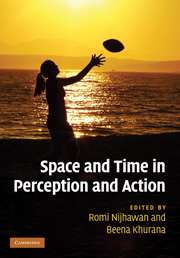Book contents
- Frontmatter
- Contents
- List of contributors
- Acknowledgments
- 1 Space and time: the fabric of thought and reality
- Part I Time–space during action: perisaccadic mislocalization and reaching
- 2 The internal eye position signal, psychophysics, and neurobiology
- 3 Factors influencing perisaccadic visual mislocalization
- 4 Visual and nonvisual factors in perisaccadic compression of space
- 5 Keeping vision stable: rapid updating of spatiotopic receptive fields may cause relativistic-like effects
- 6 Combined influences of extraretinal signals, retinal signals, and visual induction on space perception and manual behavior in perisaccadic and steady viewing
- 7 Space constancy: the rise and fall of perceptual compensation
- 8 Intercepting moving objects: do eye movements matter?
- 9 The utility of visual motion for goal-directed reaching
- Part II Temporal phenomena: perception
- Part III Temporal phenomena: binding and asynchrony
- Part IV Spatial phenomena: forward shift effects
- Part V Space–time and awareness
- Index
- References
8 - Intercepting moving objects: do eye movements matter?
from Part I - Time–space during action: perisaccadic mislocalization and reaching
Published online by Cambridge University Press: 05 October 2010
- Frontmatter
- Contents
- List of contributors
- Acknowledgments
- 1 Space and time: the fabric of thought and reality
- Part I Time–space during action: perisaccadic mislocalization and reaching
- 2 The internal eye position signal, psychophysics, and neurobiology
- 3 Factors influencing perisaccadic visual mislocalization
- 4 Visual and nonvisual factors in perisaccadic compression of space
- 5 Keeping vision stable: rapid updating of spatiotopic receptive fields may cause relativistic-like effects
- 6 Combined influences of extraretinal signals, retinal signals, and visual induction on space perception and manual behavior in perisaccadic and steady viewing
- 7 Space constancy: the rise and fall of perceptual compensation
- 8 Intercepting moving objects: do eye movements matter?
- 9 The utility of visual motion for goal-directed reaching
- Part II Temporal phenomena: perception
- Part III Temporal phenomena: binding and asynchrony
- Part IV Spatial phenomena: forward shift effects
- Part V Space–time and awareness
- Index
- References
Summary
Summary
Due to neuromuscular delays and the inertial properties of the arm people must consider where a moving object will be in the future if they want to intercept it. We previously proposed that people automatically aim ahead of moving objects they are trying to intercept because they pursue such objects with their eyes, and objects that are pursued with the eyes are mislocalized in their direction of motion. To test this hypothesis we examined whether asking subjects to fixate a static point on a moving target's path, rather than allowing them to pursue the target with their eyes, makes them try to intercept the target at a point that the target has already passed. Subjects could not see their hand during the movement and received no feedback about their performance. They did tend to cross the target's path later – with respect to when the target passed that position – when not pursuing the target with their eyes, but the effect of fixation was much smaller than we predicted, even considering that the subjects could not completely refrain from pursuing the moving target as their hand approached it. Moreover, when subjects first started to move, their hands did not aim farther ahead when pursuing the target than when trying to fixate. We conclude that pursuing the target with one's eyes may be important for interception, but not because it gives rise to localization errors that predict the target's displacement during the neuromuscular delay.
Information
- Type
- Chapter
- Information
- Space and Time in Perception and Action , pp. 109 - 120Publisher: Cambridge University PressPrint publication year: 2010
References
Accessibility standard: Unknown
- 3
- Cited by
